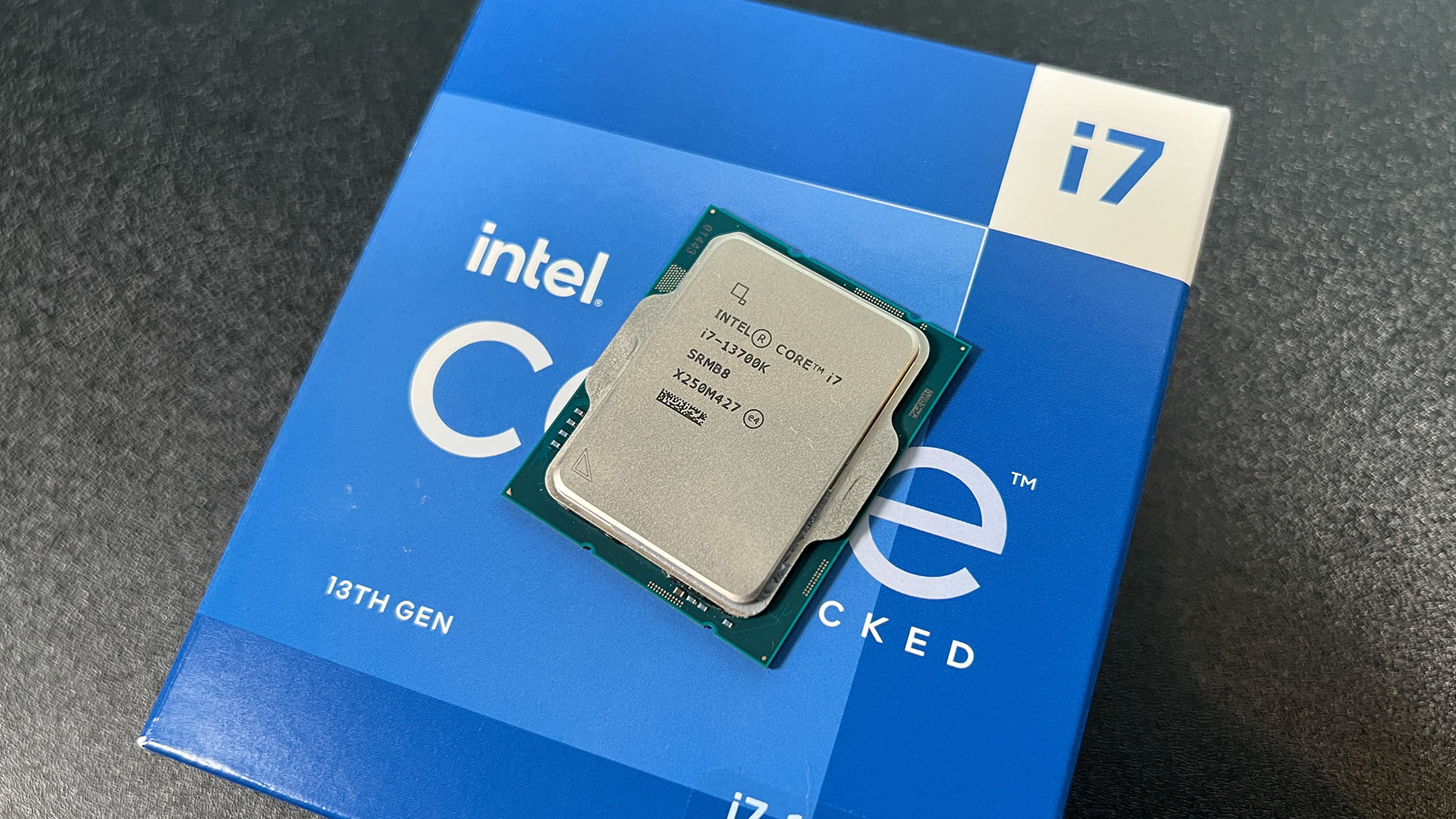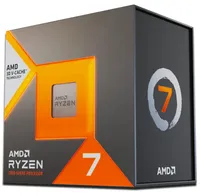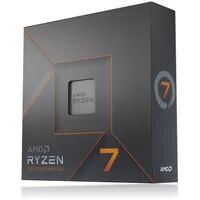TechRadar Verdict
The Intel Core i7-13700K is an outstanding processor for just about every purpose, making it a great workhorse CPU that can get all manner of work done quickly. Its energy efficiency is laughable, unfortunately, making it a poor choice for any low-profile, low-power PC builds despite it being well-priced.
Pros
- +
Best-in-class performance
- +
Excellent price
- +
DDR4 and DDR5 support
Cons
- -
Absolutely drunk on (electrical) power
- -
Runs hot, so get a great cooler
Why you can trust TechRadar
Intel Core i7-13700K: Two-minute review
While the Intel Core i9-13900K gets all the tech accolades, the Intel Core i7-13700K is truly the shoulders of Intel Raptor Lake's success, and it's not hard to see why.
For starters, the Intel Core i7-13700K, like the rest of the Raptor Lake launch lineup, offers a fair degree of versatility when it comes to your hardware. Specifically, the ability to continue to use DDR4 RAM, unlike archrival AMD's Zen 4, which forces you to buy the more expensive memory and toss your old memory sticks in the responsibly-recycle-your-electronics bin.
Like its launch siblings, the i7-13700K is also a pretty thirsty chip, and while it doesn't raise to the level of the frankly scandalous power consumption of the i9-13900K, the i7-13700K is far from a teetotaler when it comes to electrons.
The corollary is obviously the issue of heat management, which is a recurring problem with Intel chips since the launch of Alder Lake back in 2021. These problems remain, and while they aren't as severe as they were with Alder Lake, don't expect to skate by with anything less than a solid power supply unit and one of the best CPU coolers you can get your hands on.
Leaving that aside, probably the most important point in the i7-13700K's column is its price. With an MSRP of $419 / £399 / AU$669, you're getting a very solid bargain for a chip of this quality, and it's a great value proposition since this chip will likely carry you pretty far down the road while grinding out some serious work in the process.
And even as AMD is making some truly impressive moves with its 3D V-Cache technology (check out my AMD Ryzen 7 7800X3D review or AMD Ryzen 9 7950X3D review for more details on that innovation), Intel is charting its own course with its spin on Arm's big.LITTLE architecture, with some truly impressive results.
As such, the i7-13700K is an absolute workhorse of a CPU that will get you through every task you throw at it with a fair amount of ease, even if it doesn't do any one thing especially well. Instead, it will give you more than satisfying performance across the board so you don't have to worry that you are making too much of a compromise in gaming performance for some better productivity workflows.
Sign up for breaking news, reviews, opinion, top tech deals, and more.
It's the kind of chip that you can quite easily build just about any kind of system around so long as you're serious about getting stuff done, but want to leave room for flexibility and doing a lot of everything reasonably well. If that's what you're after, the Intel Core i7-13700K is the best processor for the job.
Intel Core i7-13700K: Price & availability
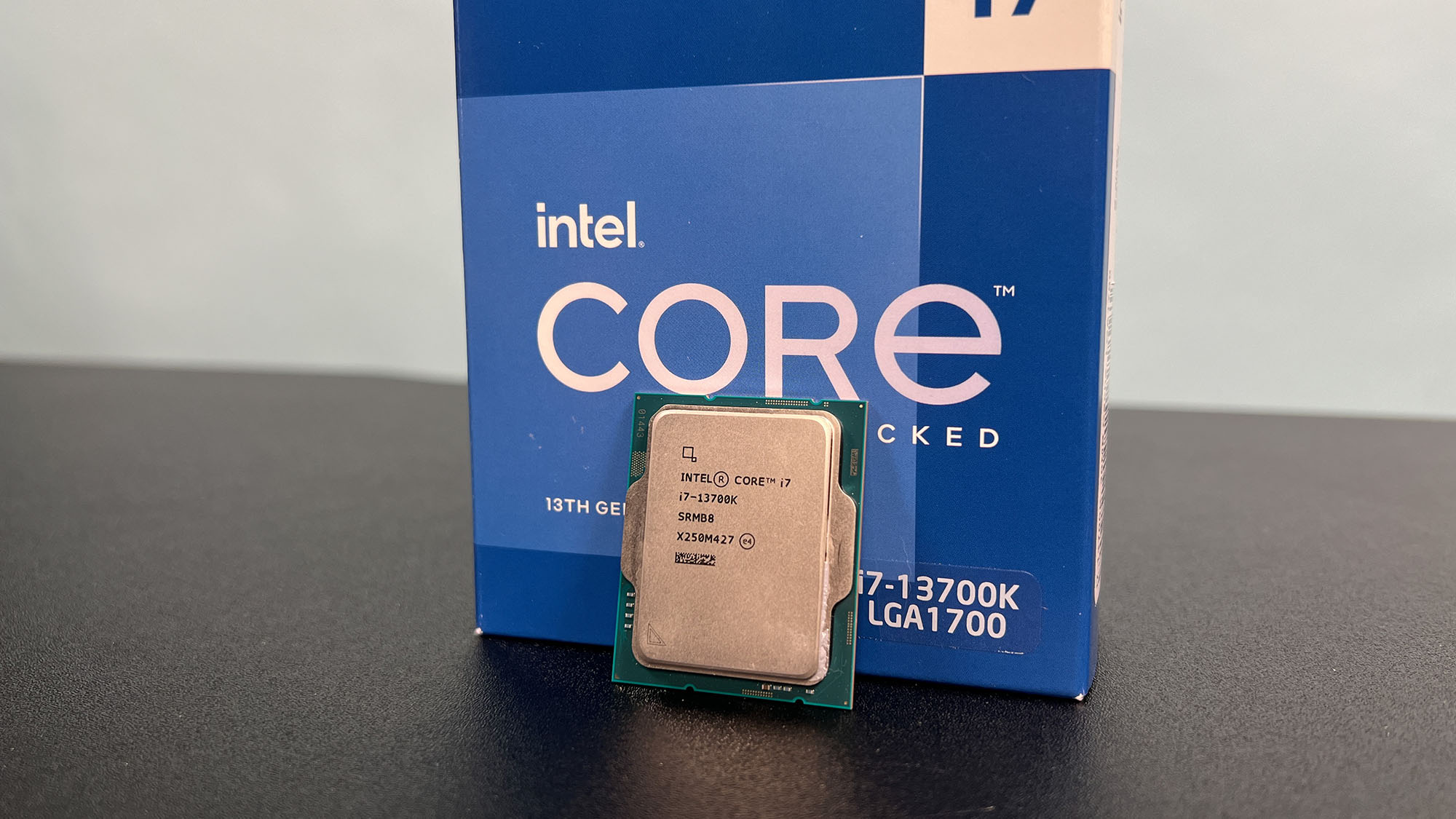
- Recommended retail price: $419 / £399 / AU$669
- Between Ryzen 7 7700X and Ryzen 7 7800X3D in price
The Intel Core i7-13700K is available now in the US, UK, and Australia for a suggested retail price of $419, £399, and AU$669, respectively. This puts it about 29% cheaper than the Core i9-13900K, about 6.6% cheaper than AMD's Ryzen 7 7800X3D, and about 5% more expensive than AMD's non-3D Ryzen 7 7700X.
This is also a drop in price over the previous generation i7-12700K, which has an official MSRP of $460, or about £395 or AU$667, so it's a boon to get some price deflation for a change.
Of course, if you haven't already upgraded to Intel Alder Lake, the cost of the processor will also have to factor in the cost of the motherboard since Raptor Lake runs on the LGA 1700 platform introduced with Intel's 12th-gen chips.
By now, CPU coolers should have all the hardware you need to fit your old cooler onto the new chip. However, there have been some issues with this in the past, and improper cooling is going to lead your brand-new processor to get throttled pretty quickly, tanking its performance and defeating its purpose altogether.
How much that will all add up to in your shopping basket is a hard one to answer, but it won't be as simple as just paying for the chip if you're upgrading from an AMD system or an 11th-gen Intel system or older.
- Price score: 4 / 5
Intel Core i7-13700K: Chipset & features
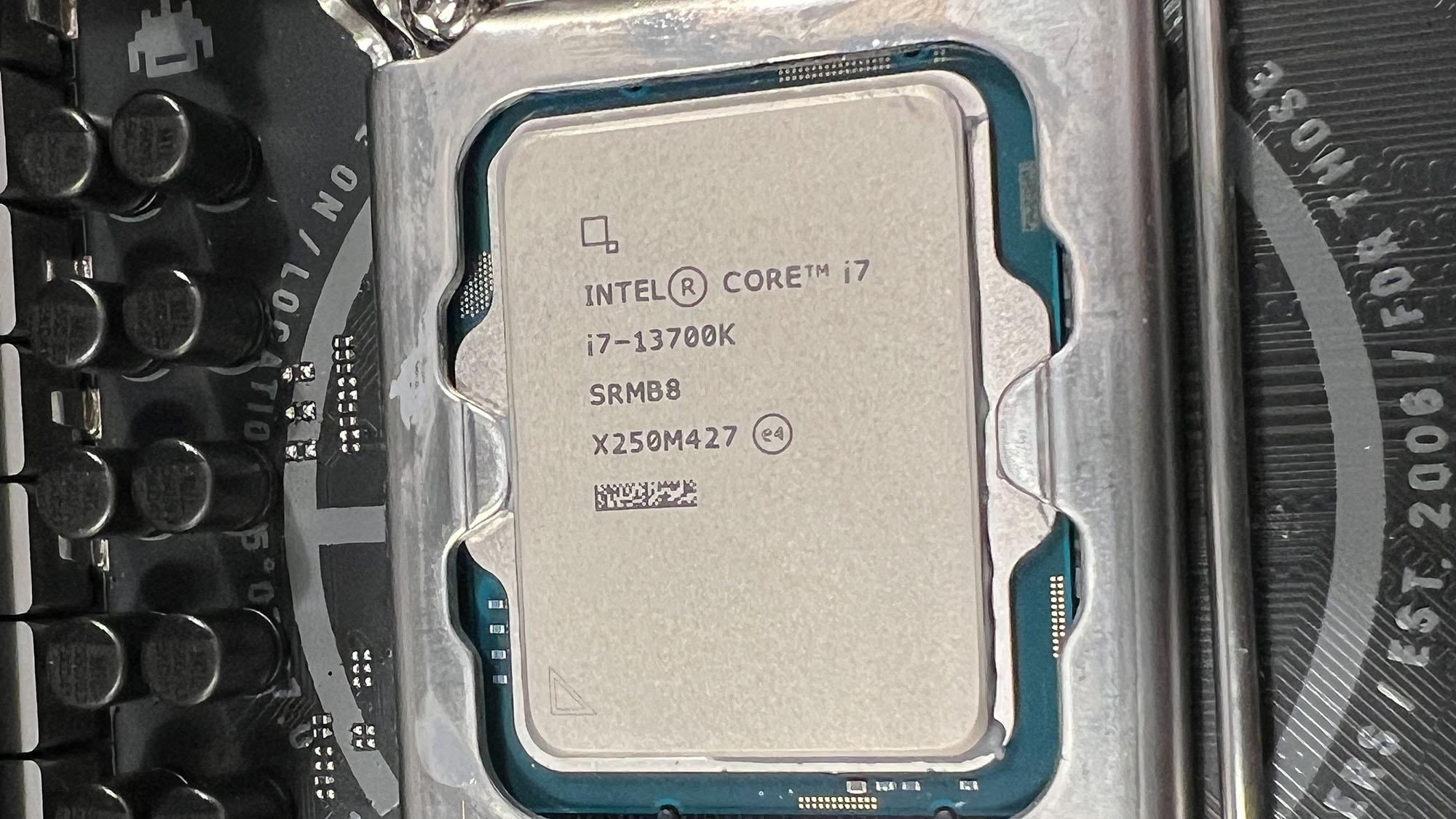
| Header Cell - Column 0 | Intel Core i7-13700K | AMD Ryzen 7 7800X3D | AMD Ryzen 7 7700X |
|---|---|---|---|
| Performance cores | 8 | 8 | 8 |
| Efficiency cores | 8 | 0 | 0 |
| Threads | 24 | 16 | 16 |
| Base Frequency (GHz) | 3.40 | 4.20 | 5.40 |
| Boost Frequency (GHz) | 5.40 | 5.00 | 5.40 |
| L3 Cache (MB) | 54 | 104 | 40 |
| TDP (W) | 125 | 120 | 105 |
- Overclockable
- Supports DDR4 and DDR5
The Intel Core i7-13700K is Team Blue's second major attempt at a higher-performant big.LITTLE chip, and there have been some very solid improvements in the architecture to be sure.
These are the systems I used to test desktop CPU performance for both AMD and Intel chips in this review:
Intel
CPU Cooler: Cougar Poseidon GT 360 AIO
Graphics card: Nvidia GeForce RTX 4090
DDR5 RAM: 32GB Corsair Dominator Platinum @ 5,200MHz & 32GB Kingston Fury Beast @ 5,200MHz
Motherboard: MSI MPG Z690 Carbon Wifi
SSD: Samsung 980 Pro SSD @ 1TB
Power Supply: Corsair AX1000 80-Plus Titanium (1000W)
Case: Praxis Wetbench
AMD
CPU Cooler: Cougar Poseidon GT 360 AIO Cooler
Graphics card: Nvidia GeForce RTX 4090
DDR5 RAM: 32GB Corsair Dominator Platinum @ 5,200MHz & 32GB G.Skill Trident Z5 Neo @ 5,200MHz
Motherboard: ASRock X670E Taichi
SSD: Samsung 980 Pro SSD @ 1TB
Power Supply: Corsair AX1000 80-Plus Titanium (1000W) Case: Praxis Wetbench
Raptor Lake is fabbed on Intel's "Intel 7" node, which is the company's new branding for its 10nm Enhanced SuperFin process, which Intel maintains performs equivalent to a 7nm chip fabbed by TSMC. Given the performance scores posted by Intel 7 versus, say, AMD Zen 4's TSMC 7nm chips, you can't exactly call Intel a liar here. To be clear, it is still a 10nm chip at its core, but the i7-13700K is as fast or faster than comparable 7nm chips for sure.
It also has a deceptively low "base" TDP of just 125W, which is a wattage you will rarely see while this chip is under load. It can max out at 253W in Turbo mode, which is what you'll be in when you play the PC games or render a complex 3D scene, so expect numbers that high on the regular.
Like the rest of the Raptor Lake lineup, the i7-13700K supports DDR5 RAM (up to 128GB) and has a max memory bandwidth of 89.6GB/s. It can also support DDR4 RAM as well for all those holdouts out there who are waiting til the last minute to get aboard the DDR5 bandwagon.
There's a 24MB main L2 cache, along with an additional 30MB "smart cache" to bring the total up to 54MB. This is fully 50MB lower than what the Ryzen 7 7800X3D is offering, so cache-intensive workloads like 1080p gaming are going to bottleneck quicker on the i7-13700K than on the Ryzen 7 7800X3D.
The i7-13700K also comes with integrated Intel UHD graphics and DirectX12 support. And while it can push up to 8K@60Hz, don't expect to game or anything on this chip. It's absolutely not a full APU that can power a cheap gaming PC on its own.
Finally, the Intel Core i7-13700K is fully overclockable, something that AMD's 7800X3D or Ryzen 9 7950X3D can't boast (though limited overclocking through presets on AMD Ryzen 7000-series 3D V-Cache chips is possible).
- Chipset & features score: 4 / 5
Intel Core i7-13700K: Performance
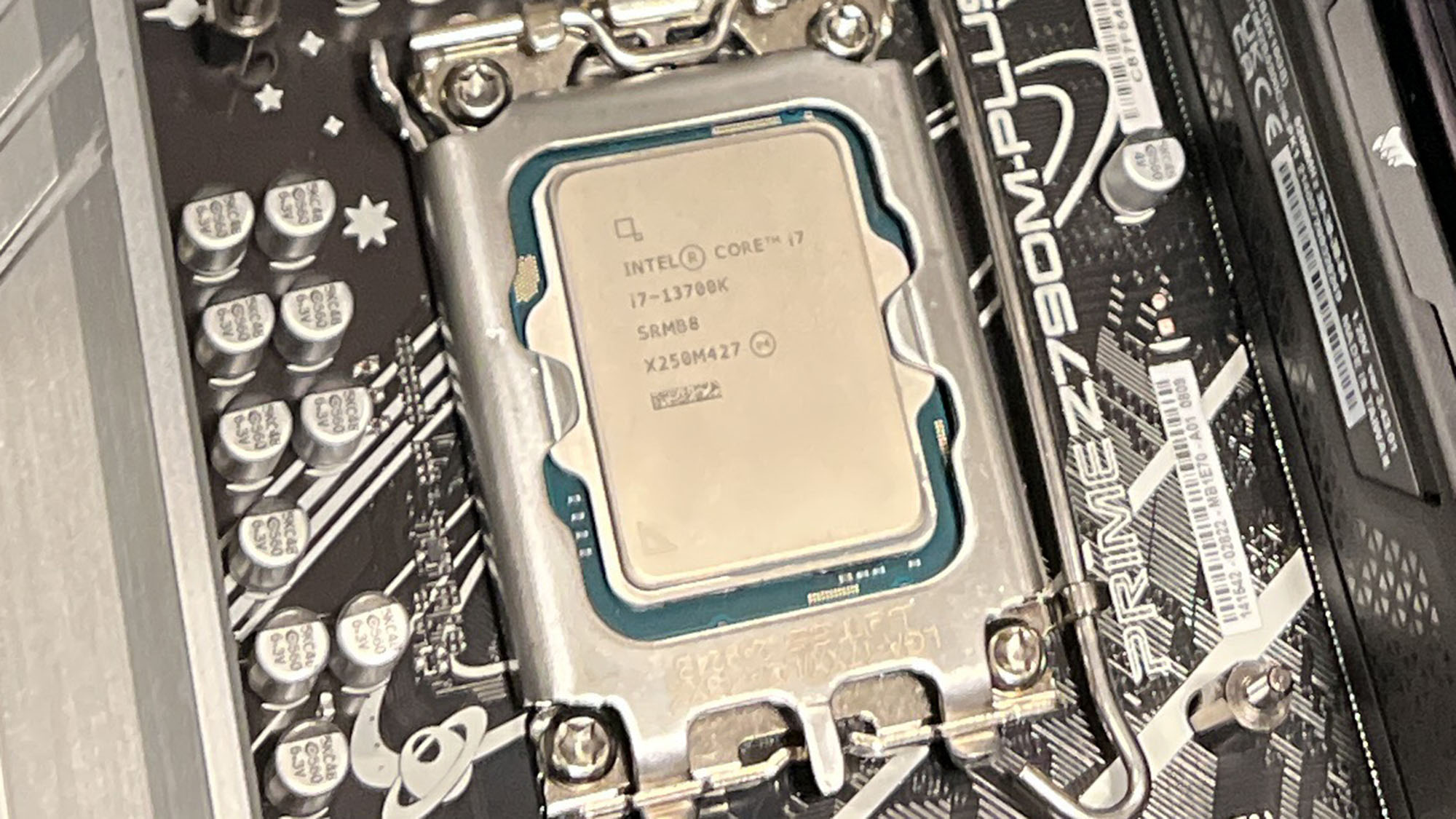
- Fantastic all around performance
- Excels at productivity and creative work
- Competent gaming chip
The performance of the Core i7-13700K is among its best selling points, though not because it's breaking any real records. What makes the i7-13700K so attractive is that it does everything well enough that you really won't find anything to complain about, especially if you're not comparing a dozen chips side by side like I've been doing all month.
| Header Cell - Column 0 | 13700K | 7700X | Performance Difference |
|---|---|---|---|
| Geekbench Single | 2028 | 2013 | 0.76% |
| Geekbench Multi | 19405 | 13528 | 43.45% |
| CineBench R23 Single | 2067 | 1832 | 12.85% |
| CineBench R23 Multi | 30547 | 19776 | 54.47% |
| 3DMark Timespy CPU | 17823 | 13192 | 35.11% |
| PCMark 10 | 9864 | 9593 | 2.82% |
| V-Ray 5 CPU | 19461 | 14938 | 30.28% |
Across general CPU benchmark tests, the i7-13700K consistently outperforms the AMD Ryzen 7 7700X, including nearly 55% better multicore performance in CinebenchR23, and almost 43.5% better multicore performance in Geekbench 5. It also racks up 35.11% better 3DMark Timespy CPU performance and 30.28% better V-Ray 5 CPU performance.
The closest the Ryzen 7 7700X comes to the Core i7-13700K is in Geekbench single-core performance, where it effectively ties the Intel chip, though CinebenchR23's single-core scores show the 13700K with a healthy lead.
| Header Cell - Column 0 | 13700K | 7800X3D | Difference |
|---|---|---|---|
| Geekbench Single | 2028 | 1,888 | 7.41% |
| Geekbench Multi | 19405 | 13,052 | 48.67% |
| CineBench R23 Single | 2067 | 1,700 | 21.59% |
| CineBench R23 Multi | 30547 | 17,877 | 70.87% |
| 3DMark Timespy CPU | 17823 | 12,648 | 40.92% |
| PCMark 10 | 9864 | 9,184 | 7.40% |
| V-Ray 5 CPU | 19461 | 14938 | 36.84% |
Similarly, against the Ryzen 7 7800X3D, the Core i7-13700K puts up very strong numbers in synthetic tests, including a nearly 71% better multicore performance in CinebenchR23 and a nearly 49% better multicore performance in Geekbench 5. Like with the 7700X, the single core performance is closer, with the i7-13700K coming up with a roughly 7.5% better score in Geekbench 5, but the i7-13700K pulls clearly into the lead with a nearly 22% better CinebenchR23 single core score.
| Header Cell - Column 0 | 13700K | 7700X | Performance Difference |
|---|---|---|---|
| Blender Monster | 185 | 132 | 40.15% |
| Blender Junkshop | 112 | 87 | 28.74% |
| Blender Classroom | 81 | 68 | 19.12% |
| PugetBench for Adobe Photoshop | 1446 | 1370 | 5.54% |
| PugetBench for Adobe Premiere | 1307 | 1130 | 15.66% |
| HandBrake 1.6 (FPS) | 103 | 82 | 25.61% |
| Header Cell - Column 0 | 13700K | 7800X3D | Performance Difference |
|---|---|---|---|
| Blender Monster | 185 | 133 | 39.09% |
| Blender Junkshop | 112 | 81 | 38.27% |
| Blender Classroom | 81 | 65 | 24.61% |
| PugetBench for Adobe Photoshop | 1446 | 1317 | 9.79% |
| PugetBench for Adobe Premiere | 1307 | 1058 | 23.53% |
| HandBrake 1.6 (FPS) | 103 | 79 | 30.37% |
In creative workflows, the Core i7-13700K outperforms both of AMD's midrange Ryzen 7 offerings to a fairly substantial degree. There isn't much difference between the two Ryzen 7 chips in terms of creative performance, and whether its rendering performance in Blender, Adobe Photoshop and Premiere performance, or video encoding, the i7-13700K averages about 13-18% better creative workload performance than the competing Ryzen 7 chips.
| Header Cell - Column 0 | 13700K | 7700X | Performance Difference |
|---|---|---|---|
| Returnal (Min FPS, 1080p, lowest) | 106 | 81 | 30.86% |
| Returnal (Avg FPS, 1080p, lowest) | 195 | 158 | 23.10% |
| Total War: Warhammer III Battle (Min FPS, 1080p, lowest) | 527 | 443 | 19.04% |
| Total War: Warhammer III Battle (Avg FPS, 1080p, lowest) | 605 | 532 | 13.72% |
| F1 2022 (Min FPS, 1080p, lowest) | 329 | 375 | -12.27% |
| F1 2022 (Avg FPS, 1080p, lowest) | 454 | 423 | 7.41% |
| Tiny Tina's Wonderland (Min 1% FPS, 1080p, lowest) | 333 | 242 | 37.60% |
| Tiny Tina's Wonderland (Avg FPS, 1080p, lowest) | 408 | 390 | 4.62% |
For gaming, the Core i7-13700K comes out on top in nearly every title we tested against the Ryzen 7 7700X. The only game where it lagged behind was in F1 2022, but that was only its minimum fps, with the 13700K bottoming out at 329 fps compared to the 7700X's 375 fps, for a roughly 12% slower fps floor. The 13700K still came out on top with an average fps of 454, compared to the 7700X's 423 fps, or about 7.5% better average fps.
Everywhere else, the 13700K is the clear winner over the Ryzen 7700X, with 10.57% higher fps floor on average and a 13.53% higher average fps overall.
| Header Cell - Column 0 | 13700K | 7800X3D | Performance Difference |
|---|---|---|---|
| Returnal (Min FPS, 1080p, lowest) | 106 | 111 | -4.07% |
| Returnal (Avg FPS, 1080p, lowest) | 195 | 224 | -13.17% |
| Total War: Warhammer III Battle (Min FPS, 1080p, lowest) | 527 | 464 | 13.77% |
| Total War: Warhammer III Battle (Avg FPS, 1080p, lowest) | 605 | 552 | 9.70% |
| F1 2022 (Min FPS, 1080p, lowest) | 329 | 434 | -24.19% |
| F1 2022 (Avg FPS, 1080p, lowest) | 454 | 550 | -17.39% |
| Tiny Tina's Wonderland (Min 1% FPS, 1080p, lowest) | 333 | 416 | -19.86% |
| Tiny Tina's Wonderland (Avg FPS, 1080p, lowest) | 408 | 494 | -17.33% |
But the Ryzen 7700X isn't AMD's gaming-focused chip. That would be the Ryzen 7 7800X3D, and here the Core i7-13700K has some very real competition. Only in our Total War: Warhammer III Battle benchmark tests did the i7-13700K score a win. The 13700K achieves a floor of 527 fps and an average of 605 fps compared to Ryzen 7 7800X3D's 464 minimum fps and 552 average fps for a 13.77% and 9.7% higher minimum and average frame rate, respectively.
Everywhere else though, the i7-13700K comes up short, sometimes by nearly 25%. Overall, the i7-13700K is about 9% slower than the Ryzen 7 7800X3D, in both minimum fps and average fps tests.
| Header Cell - Column 0 | 13700K | 7700X | 7800X3D |
|---|---|---|---|
| Synthetic Performance | 14456 | 10696 | 10082 |
| Creative Performance | 539 | 478 | 456 |
| Gaming Performance (Min) | 324 | 285 | 356 |
| Gaming Performance (Avg) | 415 | 376 | 455 |
| Final Performance Score | 5114 | 2996 | 2854 |
Overall, there's no question that the Intel Core i7-13700K is the best processor in its class, especially for those who need a CPU that can do a lot of things and do them very well. While it might not have the unbridled horsepower of the Core i9-13900K, it's definitely more than enough for most users who need a certain degree of performance without going overboard. And while the Ryzen 7 7800X3D is the best gaming processor of the three midrange chips on offer, it's not so much better than the Core i7-13700K needs to be ashamed of itself, especially when it is so much better at everything else than the competition.
| Header Cell - Column 0 | 13700K | 7700X | 7800X3D |
|---|---|---|---|
| Min Power Draw (W) | 8.227 | 17.341 | 16.783 |
| Max Power Draw (W) | 282.028 | 143.910 | 75.652 |
| Min Temperature (°C) | 30.0 | 32.1 | 32.3 |
| Max Temperature (°C) | 94.0 | 91.0 | 79.9 |
That level of performance has to come from somewhere though, and if there's a serious defect in the i7-13700K it's its power consumption. Boy howdy does this chip absolutely binge on electricity. It's not as bad as the Core i9-13900K's peak 332W power draw, but it's not far behind with a 282.028W peak recorded during testing.
On the plus side, its minimum power draw is just 8.227W, compared to the 7700X's 17.341W and the 7800X3D's 16.783W, so this chip is going to use a lot less power when it's idling than the competition. If you're going to be using this chip for extended periods though, the 7700X only maxes out at 143.910W, while the 7800X3D is downright temperate with just 75.652W max power draw during our tests.
This pretty much locks the i7-13700K out of the running as a low-profile, low-power system processor unless you undervolted it to keep it within a smaller PSU's power rating. That will ultimately defeat the purpose of this chip though, and if you're looking to go for a low-power build, you're best bet is the Ryzen 7 7800X3D.
- Performance: 4.5 / 5
Should you buy the Intel Core i7-13700K?
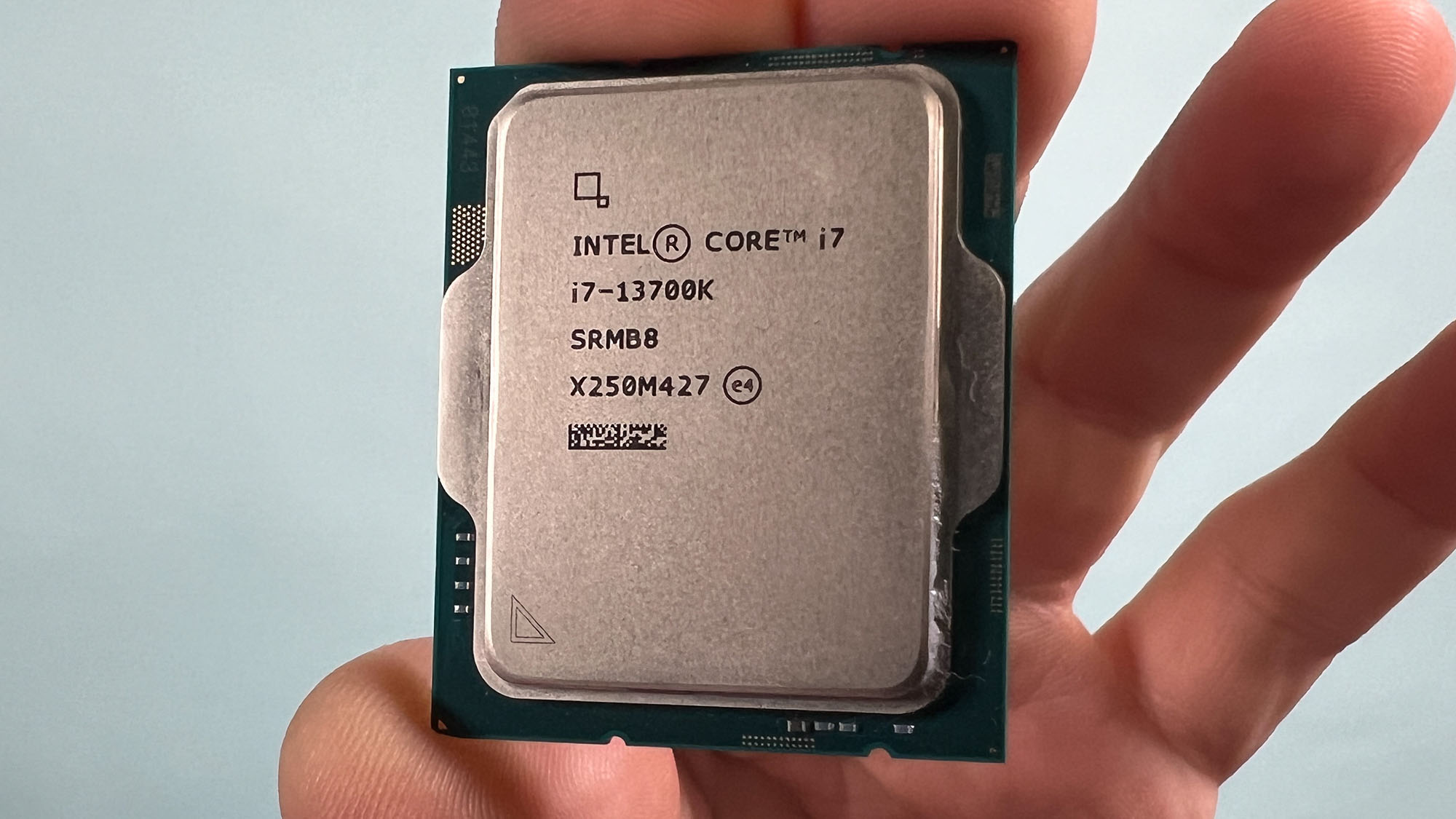
| Header Cell - Column 0 | Notes | Rating |
|---|---|---|
| Value | Given the level of performance on offer at this price, this is one of the best values you're going to find in a CPU. | 4 / 5 |
| Chipset & features | The second-gen big.LITTLE architecture from Intel really shines here, as does the ability to use DDR4 RAM with it. | 4 / 5 |
| Performance | There is nothing that this chip can't do very well, if not outright blow away competing chips. It comes at a very high power cost though. | 4.5 / 5 |
| Final score | Row 3 - Cell 1 | 4.167 / 5 |
Buy it if...
You want the best CPU without paying a fortune
This chip offers the best balance of price and performance of any processor on the market.
You want to use your existing DDR4 RAM
Unlike AMD's Zen 4, Intel Raptor Lake chips let you keep using your old DDR4 RAM, which helps defray some upgrading costs.
You leave your PC idling a lot
While I would always say it's better to turn off a computer you're not using, if you're leaving your PC running all the time when you're not using it, the lower idling power draw on this processor will help save on your energy bills.
Don't buy it if...
You want the best gaming processor at this price
If you're purely looking for a gaming CPU at this price point, then you're better off with the Ryzen 7 7800X3D, which is only $30 more.
You don't have a powerful CPU cooler
We aren't at the stage where you'll need an AC to cool this chip, but even with a 360mm AIO cooler, this chip hit 94 degrees Celsius under load.
You're worried about energy usage
If you have a smaller PSU in the 500W to 600W range, this chip alone will eat up half of that capacity under load.
Also Consider
| Header Cell - Column 0 | Intel Core i7-13700K | AMD Ryzen 7 7800X3D | AMD Ryzen 7 7700X |
|---|---|---|---|
| Price | $419 (about £355 / AU$610) | $449 (about £385 / AU$650) | $399 (about £340 / AU$580) |
| Performance Cores | 8 | 8 | 8 |
| Efficiency Cores | 8 | 0 | 0 |
| Threads | 24 | 16 | 16 |
| Base Clock (GHz) | 3.40 | 4.20 | 4.50 |
| Boost Clock (GHz) | 5.40 | 5.00 | 5.40 |
| Cache (MB) | 54 | 104 | 40 |
| TDP (W) | 125 | 120 | 105 |
| Motherboard Socket | LGA 1700 | AM5 | AM5 |
If my Intel Core i7-13700K review has you considering other options, here are two processors to consider...
AMD Ryzen 7 7800X3D
The AMD Ryzen 7 7800X3D might not have the kind of general performance prowess of the i7-13700K, but this chip isn't about all that. It's strictly for gaming at your best at a decent enough price, and few do it better than the 7800X3D.
Read the full AMD Ryzen 7 7800X3D review
AMD Ryzen 7 7700X
While it doesn't have the gaming chops of the 7800X3D, the Ryzen 7 7700X is still a stronger processor generally thanks to faster clock speeds. It's also a good deal cheaper, so it's a good balance of performance and price if the i7-13700K isn't to your liking.
Read the full AMD Ryzen 7 7700X review
How I tested the Intel Core i7-13700K
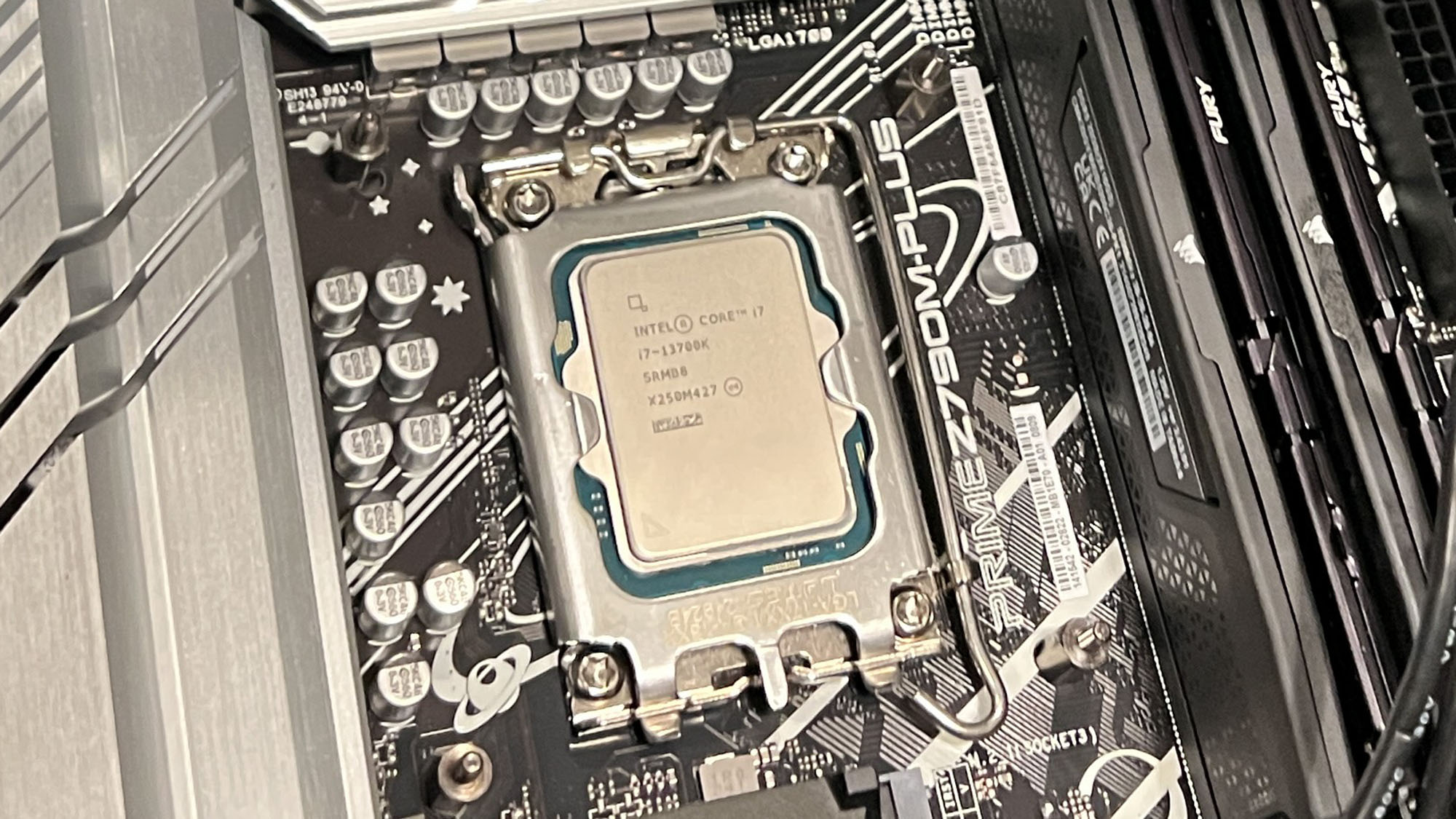
- I spent nearly two weeks testing the Intel Core i7-13700K
- I ran comparable benchmarks between this chip and rival processors
- I gamed with this chip for several days
I spent an extensive amount of time testing the Core i7-13700K over the past two weeks, including using the processor in my primary work and gaming machine at home.
In addition to general work tasks and gaming, I used the processor extensively for content creation work like Adobe Photoshop, Adobe Illustrator, and Blender 3D modeling.
I also ran an extensive battery of benchmark tests on this chip and rival CPUs a customer might consider, using as close to identical hardware as possible in order to gather sufficient comparable data to determine how the chips performed in real-life and simulated workloads.
First reviewed April 2023

John (He/Him) is the Components Editor here at TechRadar and he is also a programmer, gamer, activist, and Brooklyn College alum currently living in Brooklyn, NY.
Named by the CTA as a CES 2020 Media Trailblazer for his science and technology reporting, John specializes in all areas of computer science, including industry news, hardware reviews, PC gaming, as well as general science writing and the social impact of the tech industry.
You can find him online on Bluesky @johnloeffler.bsky.social
